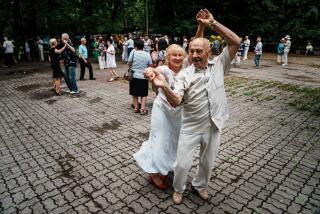Strife in Croatia Hits Home With Basketball Player : High schools: Capistrano Valley Christian’s Ivana Kovacic plays despite the pain of war in her homeland.
- Share via
SAN JUAN CAPISTRANO — Ivana Kovacic tries to conceal the sadness, but her eyes and voice won’t allow it. There’s death and devastation in her homeland, and the pain reaches across an ocean and two continents.
Although she’s thousands of miles away, Kovacic is never too far from the bloody war in Croatia, and never failing to be disgusted by what is happening there.
“I don’t understand how they can kill so many people,” Kovacic said. “Before, it was so peaceful there, and now so many people die.”
Kovacic, 18, is a 6-foot-2 senior center on the Capistrano Valley Christian girls’ basketball team. She was born in Zadar, a Croatian town of about 44,000 on the shores of the Adriatic.
She came alone to the United States in July, 1991, mainly to visit her brother, but also because her parents wanted her away from the brutality and chaos in Croatia.
The visit turned into an extended stay.
At first, Kovacic lived in La Mirada with her brother, Emilio, a 6-10 center who had just finished playing college basketball at Biola after stints at Grand Canyon College in Phoenix and Arizona State. But when he failed to make the Phoenix Suns after a tryout, Emilio and his American-born wife, Amber, moved to Croatia, where he now plays professionally.
By then, Capistrano Valley Christian athletic director Jeff Zippi and his wife, Christine, had heard about Kovacic and made arrangements for her to attend the school and live with them. Kovacic stayed with the Zippi family until last summer and then moved to teammate Marcy Giosa’s home.
Kovacic, who for several years played for club teams--Yugoslavian schools generally don’t field interscholastic teams--was looking forward to joining the Capistrano Valley Christian team and using the game as a buffer, culturally and emotionally.
But because CIF rules restrict foreign transfer students from playing for American schools for one year, Kovacic faced the possibility of sitting out last season. Zippi, however, asked the Southern Section for a hardship waiver and received one that permitted Kovacic to play on the Eagle junior varsity squad last season.
“I told (Southern Section commissioner) Stan Thomas that their decision really lifted her spirits,” Zippi said.
So far this season, Kovacic has helped lift the Eagles to a 5-2 record. She easily leads the team with an average of 11.7 rebounds and two blocks, and is second behind Giosa in scoring, averaging 10.4 points. Her play is one reason why Coach Tim Shelton believes the team could be the best in school history, one that could challenge for the Olympic League title.
“She, fundamentally, has all the skills necessary to be a great basketball player,” Shelton said. “She’s had a real solid foundation. She plays the finesse-type of game the Europeans play but is learning to become more aggressive. I remember the first few times in the gym. She would giggle if she was pushed. Now, I go home with bruises when we play against each other.”
Kovacic wouldn’t mind going home herself, but conditions there remain too unstable. Her parents, Franko and Kata, have been forced to seek shelter during bombing raids, and her grandmother’s home in a small village near Zadar was destroyed. She and two of Kovacic’s cousins had to flee to the north.
“The Serbs took over the whole village,” Kovacic said.
For Kovacic, this and last Christmas have been bittersweet. She spent the holidays last year with her brother and sister-in-law, and this year she plans to share them with Giosa and her family, but she still misses her parents. The weekly letters she writes and the regular telephone calls--when they get through--are as close as she’s been to them in 18 months.
“Last year, we didn’t get ahold of my parents until a few days after Christmas,” Kovacic said. “They have a phone, but it wasn’t working. They had to go to the post office to call us.”
Kovacic said her parents also called, panicky, after some of the recent Southland earthquakes.
“I would tell them, ‘Mom, they (earthquakes) are normal here,’ ” Kovacic said, laughing at the irony of two people in a war zone worrying about the well-being of others.
Dealing with the tremors, Kovacic said, was just another item in a long list of adjustments she’s had to make in the United States.
“Everything is so different,” Kovacic said. “Even the malls. We don’t have those. And the freeways. The area is huge. I couldn’t believe there were so many people in one place.”
Kovacic, who spoke rudimentary English when she arrived here, now understands the language well and carried a 3.71 grade-point average in the last quarter. She would like to attend a U.S. college but figures that without a scholarship, her chances are not good.
“I don’t know if it would happen without that,” Kovacic said. “I don’t think I can afford it.”
Whether she returns to Croatia, Kovacic hopes the volatile conditions there calm down soon, perhaps with the help of American intervention sanctioned by the United Nations.
“Maybe at least they could protect places that have not been affected by the war yet,” Kovacic said. “Or maybe they could provide food for the people who don’t have it.”
More to Read
Get our high school sports newsletter
Prep Rally is devoted to the SoCal high school sports experience, bringing you scores, stories and a behind-the-scenes look at what makes prep sports so popular.
You may occasionally receive promotional content from the Los Angeles Times.






